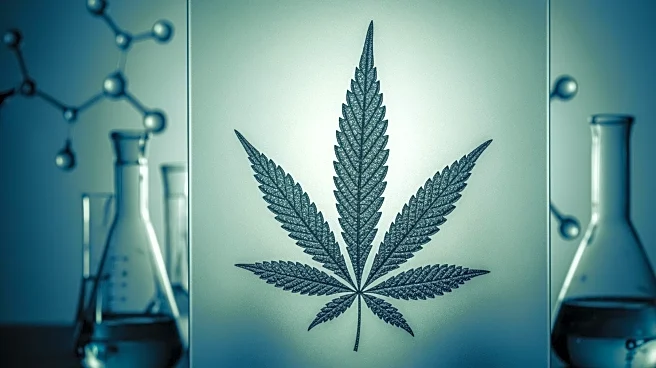What's Happening?
The U.S. Congress has enacted new restrictions on hemp products as part of the appropriations bill that ended the longest-ever government shutdown. The legislation, introduced by Sen. Mitch McConnell,
aims to close a legal loophole from the 2018 Farm Act by altering the Agricultural Marketing Act of 1946. The new law limits the total tetrahydrocannabinol (THC) concentration in hemp products, such as low-dose cannabis drinks and edibles, to 0.4 milligrams per container. This change is expected to significantly impact the hemp and cannabis drink industry, as over 90% of nonintoxicating hemp-derived products currently exceed this THC cap. The law is set to take effect on November 13, 2026, potentially eliminating 95% of the industry and resulting in an estimated $1.5 billion loss in tax revenue.
Why It's Important?
The new hemp restrictions have significant implications for the U.S. hemp industry, which has been growing rapidly since the legalization of hemp under the 2018 Farm Act. The reduction in allowable THC levels could lead to a substantial decrease in the availability of hemp-derived products, affecting consumers who use these products for health benefits such as pain relief and anxiety reduction. Additionally, the economic impact could be severe, with potential losses in tax revenue and job reductions in states heavily invested in hemp production. The legislation reflects ongoing debates about cannabis regulation and the balance between public health concerns and economic interests.
What's Next?
As the law is set to take effect in November 2026, stakeholders in the hemp industry, including farmers, manufacturers, and retailers, may seek to challenge the legislation or adapt their business models to comply with the new restrictions. There could be increased lobbying efforts to amend the law or introduce new legislation that supports the hemp industry. States with significant hemp production, such as Tennessee, may explore legal avenues to protect their local industries. The broader cannabis industry will likely monitor these developments closely, as they could set precedents for future regulatory changes.
Beyond the Headlines
The new restrictions on hemp products highlight ongoing tensions between federal and state cannabis regulations. While hemp is legal in many states, the federal government's stricter stance could lead to conflicts over jurisdiction and enforcement. This situation underscores the complexity of cannabis legislation in the U.S., where varying state laws create a patchwork of regulations. The ethical considerations of restricting access to products that provide health benefits also merit attention, as policymakers balance public health concerns with individual freedoms.









